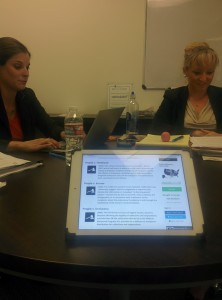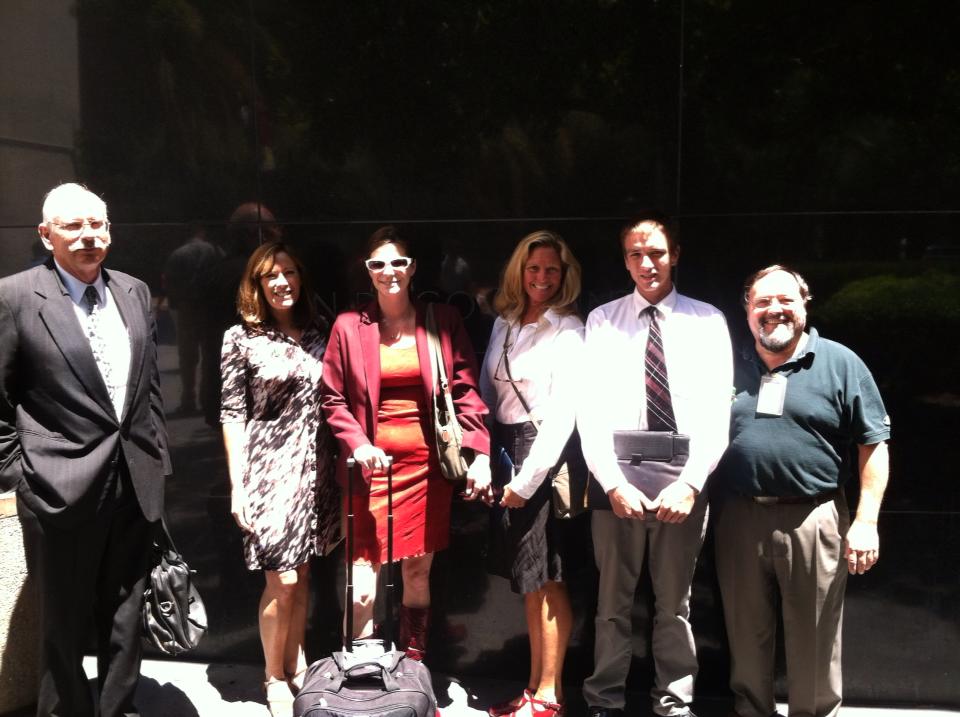
Attorneys Laura Sheppard and Samantha Birkner prepare to defeat prosecution’s pre-trial motions in Orlosky case.
October 29, 2015
By Terrie Best – San Diego Americans for Safe Access
San Diego, CA – The second medical cannabis trial of legal patient Robert Orlosky was to have begun Tuesday in San Diego superior court. Then came a welcome victory in Department 57 when Judge Charles Rogers put a stop to a mulish prosecutor and dismissed all the charges against Robert.
In Robert’s first trial back in 2013, Deputy DA Jorge Del Portillo fought hard to strip him of his rights under Prop. 215 and SB420, the two medical cannabis laws providing patient protection in California courts. The jury acquitted Robert of Possession for Sales, a weak claim that the prosecutor pushed hard. But Del Portillo was successful when he convinced the judge in the case, Peter Deddeh, to deprive Robert of the defense of collectively cultivating with his roommate. Some of the medicine belonged to his roommate and the jury was not allowed to hear that. The jurors found no evidence of sales but felt the amount of cannabis on hand was too high for one person, hence Robert was found guilty of the possession and cultivation charge.
Robert’s attorney, Laura Sheppard from the Office of Assigned Counsel, appealed the conviction on Robert’s behalf and Professor of Law, Alex Kreit argued and won the appeal. The appeals court found that Judge Deddeh had erred by accepting the argument that in order for Robert to have the right to cultivate with his roommate the two would have had to form a corporation. They said this in their opinion:
“Although a formally-organized collective may be a relevant evidentiary factor for a jury to evaluate, it is not a mandatory requirement that precludes application of the collective cultivation defense to informal joint cultivation arrangements between two qualified patients who grow marijuana exclusively for their own medical use.”
In January, 2014, the medical cannabis community was momentarily victorious at the announcement of the appeal’s outcome. Then in early 2015, Jorge Del Portillo told Laura Sheppard he intended to re-file the cultivation charge against Robert. Further, the prosecutor intended to again argue against the defense’s ability to use the protection patients have in court. This time, Jorjito – who won this nick-name in the first trial – would seize on two technicalities he unearthed from studying Robert’s two doctor recommendations. First, that Robert had renewed his recommendation three days after the previous one “expired,” resulting in three days without a “valid” recommendation. Second, the recommending doctor was on probation by the Medical Board of California so therefore in the DA’s view he was not a doctor in “good standing” as the Health and Safety code reads doctors must be. Also, Del Portillo intended to prove sales as a means of proving Robert was not entitled to his patient protections. It must be noted that Robert was found “not guilty of sales” in his first trial. However, Jorjito refused to regard the jury’s decision and had made up his own charge: Robert may not have been selling but he was certainly CULTIVATING for profit.
If Jorjito went delusional, Laura Sheppard went into gear. She hired a second chair, attorney Samantha Birkner. Expert witnesses provided her with key information to help her win this case. It was a spectacular collaboration which had an equally spectacular outcome. In most every case there are pre-trial motions where each side scrambles to stack the odds in their legal favor for good outcomes. In the Orlosky case both sides had a passel of these motions.
So, on trial day we trucked it down to court and were assigned to Dept. 57, Judge Charles G. Rogers. On the way upstairs we read everything I had written about Rogers. He had presided over a past medical cannabis case – defendant, Tim O’Shea’s. Rogers had readily admitted Dr. Michelle Sexton’s testimony in the O’Shea case and we were now certain Dr. Sexton would be approved as a witness for Robert too. We were all happy to sit before Judge Rogers. He was fair to Tim and in a hung jury situation had dismissed his charges.
Judge Rogers excused us while he read the motions from both sides. We used the time to read the DDA’s briefs and now had a peek at DePortillo’s strategy. By the end of the four hour wait, the lady lawyers had case law to dismantle almost all of Jorjito’s motions. The judge dismantled the rest for us, admitting both expert witnesses without further examination, and rejecting Jorjito’s tortured approach in trying to exclude Robert’s doctor’s recommendation. The sole motion Jorjito won the benefit of that day was the right to question cultivation expert witness Chris Conrad about his religious beliefs.
The next day was more or less a skewering of Jorjito’s case by Judge Rogers. Del Portillo awkwardly explained his two severely stretched arguments were indeed the long shots District Attorney Bonnie Dumanis’s office used to justify re-filing the second case. The Deputy DA did everything but back out of the courtroom to distance himself from his own office’s failed strategy.
Judge Rogers, in his discussion leading up to the dismissal, took great pains to make clear he was dismissing the case because the cost/benefit of retrying it – at great expense – would never result in anything but a hung jury or an acquittal. It was similar to what his Honor said after O’Shea’s hung jury.
The ordeal of Robert Orlosky was over when Judge Charles Rogers granted Laura’s 1385 motion. This tool for medical cannabis defendants holds that under Penal Code section 1385, (People v. Konow, California 2004) a defendant may informally suggest that the magistrate or superior court dismiss the information or complaint “in the interests of justice” which Rogers did.
Robert Orlosky is unburdened now, but the young man endured a lot over the past three years this ordeal has lasted. He suffers from neuropathic pain due to a bullet lodged in his femur bone. That’s why he uses cannabis therapy. Robert is among the working poor. At the age of 23, he grew less than 20 plants with his roommate, also a patient. He was raided, forced to defend himself, found unfairly guilty and punished with formal probation which lasted 18 months until his appeal was successful, only to have charges re-filed on the most bogus of reasons. Then, he refused a misdemeanor plea bargain. He’s 26 and that was a very brave thing to do! Watching him holding firm to his defense and wielding it against the DA’s power machine was a pretty great thing to see! I hope he has a long and very happy, peaceful life. He’s done his time fighting the drug war.














